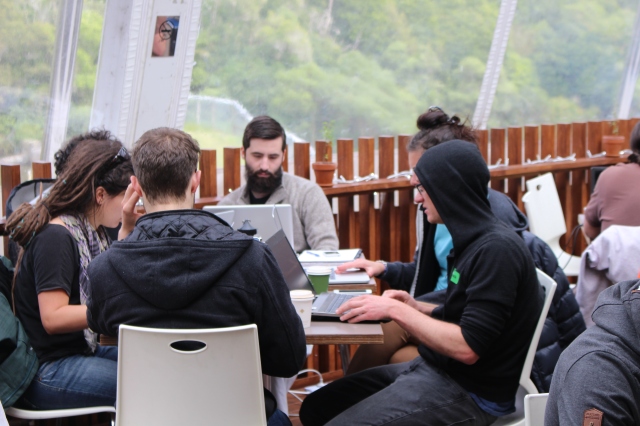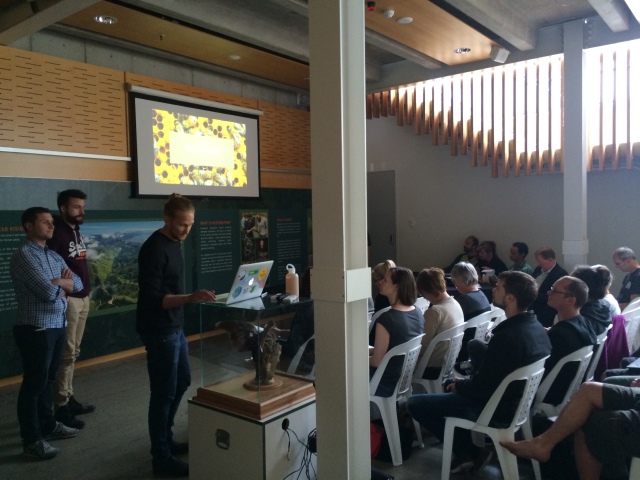NatureHack Callaghan Innovation prize winner Tim McNamara talks about adding value to land, blending ecology and commercial reality, and going without sleep.
NatureHack, a Landcare Research and Callaghan Innovation-funded weekend hackathon hosted at Wellington’s wildlife sanctuary Zealandia on November 6, 7 and 8, saw 40 hackers in 14 teams give up their sleep to mine Landcare data sources for useful applications.

Hacking at Zealandia
Data scientist McNamara, who was also a GovHack prizewinner earlier this year – was thrown together on the day with Fredrik Bergstrom and Josh Taylor – the trio had not previously met.
The team decided to develop a site for landowners to determine the suitability of specific land parcels to bee-keeping.
Wellington entrepreneur, speaker and bee-keeping aficionado Melissa Clark-Reynolds inspired the choice of topic at talk McNamara attended earlier this year, where she said one a the key challenges in the industry is the lack of information sharing among apiarists – largely because the commercial advantage in knowing the best spots for setting down hives.
The result was Airbnbee – a simple application which assesses a pin in the map for beekeeping suitability by analysing among other data set, the distance to four-wheel-drive tracks (for access), altitude (bees don’t cope well with snow) and distribution of tree species.

Airbnbee is presented to the group
“There’s currently a real information asymmetry between beekeepers and landowners. Beekeepers know about trees which are best for bees and high-value honey, but landowners know none of this.”
Resolving this imbalance could be a win-win for both parties. That’s because honey is an increasingly significant primary export ($145m in 2012/13 according to Ministry for Primary Industries figures), with the high-value Manuka industry leading the way, so land which is suitable for bee-keeping on a farm or lifestyle block could open up a good secondary income stream.
At the same time bee numbers globally are in decline, threatening a vital link in land-based primary production of virtually every kind, and making bee-keeping ecologically important, as well as a business.

Callaghan Innovation GM External Relations presents the Callaghan Innovation award to airbnbee.
“We want to encourage bees and open up sites for bee-keeping, but keep it equitable.
“We focused on providing landowners with information on the value of their property. The idea met both the ecological goals of the group and could deliver real commercial value.”
NatureHack participants didn’t know where the event was going to be hosted until they met transport at the designated spot in Central Wellington on the Friday, so how did they prepare?
“I looked through the data sets for several weeks beforehand [to get ideas],” confesses McNamara. “I originally wanted to create a species distribution linked to Forest & Bird’s ‘Bird of the Year’ event.
“When I turned up and saw the amount of money and effort being put in, I thought ‘why would Callaghan Innovation and Landcare Research invest all this?’. They’re looking for prototypes to create value for the economy as a whole.”
As the ‘data guy’ for the team, McNamara went without sleep to get the project finished. “At about 2am I thought ‘this project is competitive, it’s worth finishing’.”
The judges were certainly impressed with the outcome.
Team Hi Vis (Peter Jacobson, Iain Kirkpatrick and Jon Lemmon where named overall winners for their Fungustime application).
